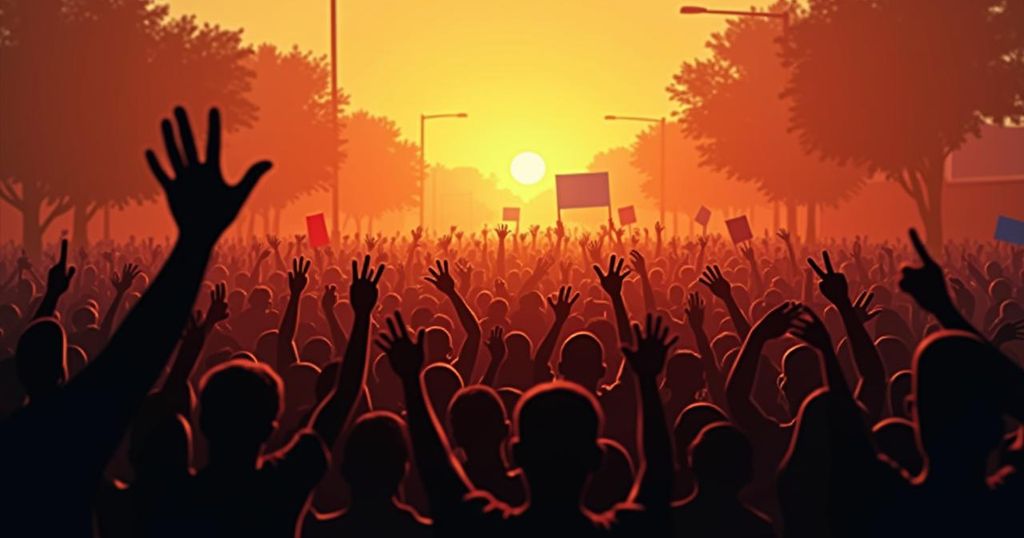On Saturday, opposition protesters gathered in Venezuela to challenge President Maduro’s claim of victory in the disputed July presidential election. Despite fears of repression, demonstrators, including notable figures such as Maria Corina Machado, voiced their dissent. The opposition argues that their candidate won, while Maduro’s government continues to assert its election results amidst international calls for dialogue and democratic reform.
Small assemblies of opposition demonstrators took place on Saturday across Venezuela, joined by international supporters, as they commemorated two months since the controversial presidential election that President Nicolas Maduro claims to have won. Opposition leader Maria Corina Machado, currently in hiding due to her denouncement of the election results as fraudulent, has urged for smaller protests to diminish the likelihood of severe crackdowns previously experienced. Approximately 30 individuals voiced their dissent in a plaza in Caracas, amongst them Leida Brito, affectionately known as the “Red Helmet Grandmother” due to her extensive history of activism against the Maduro government. She expressed, “Nicolas Maduro should leave because he lost,” while showcasing a sign stating, “To defend the vote is a right.” Retired Colonel Hidalgo Valero remarked to AFP on the fear instilled in citizens by government repression, stating, “The freedom of Venezuela is in danger.” Maria Corina Machado reached out to her supporters via a recording from her team, affirming, “Here we are standing firm, advancing every day with more strength and enthusiasm, gathered here as the brave and good Venezuela.” The aftermath of the disputed election has seen numerous arrests among opposition leaders, alongside over 2,400 other Venezuelans charged with terrorism linked to protests. The country also witnessed 27 fatalities due to clashes that erupted after the election results were announced. The opposition claims that its candidate, Edmundo Gonzalez Urrutia, actually received 67% of the vote as per their analysis of polling station data. In contrast, the pro-government National Electoral Council asserted that Maduro won with 52% in an election marred by a lack of transparency and delayed voting results. Gonzalez Urrutia, a 75-year-old former diplomat, recently sought asylum in Spain after hiding for weeks. Moreover, larger protests have occurred beyond Venezuelan borders in cities such as Mexico City, Buenos Aires, Panama City, and Montevideo. In Madrid, Gonzalez Urrutia engaged with supporters who displayed the Venezuelan flag. Concurrently, hundreds of Maduro’s adherents took to the streets in Caracas to celebrate his electoral victory, where Maduro dismissively referred to Machado as the “supposed queen bee” preparing to flee. In light of these developments, approximately 30 nations, spearheaded by the United States and Argentina, have called upon Maduro to initiate dialogues with the opposition, advocating for “constructive and inclusive discussions” toward a democratic transition and demanding the immediate release of those detained in the aftermath of the election.
The situation surrounding the contested presidential election in Venezuela is characterized by political unrest and allegations of electoral fraud. President Nicolas Maduro has maintained his position following the elections, which the opposition, led by Edmundo Gonzalez Urrutia, contest vehemently. The political landscape is increasingly fraught with tensions, as the government has resorted to arrests and repression against dissent. International scrutiny has emerged, with calls for dialogue and the need for a democratic transition gaining urgency.
In summary, the current political unrest in Venezuela exemplifies the profound tensions between the Maduro administration and the opposition. The opposition’s allegations of electoral fraud, combined with widespread arrests and repression, contribute to an increasingly volatile situation. The international community’s call for dialogue and a peaceful resolution underscores the urgent need for democratic processes within Venezuela. As the protests continue, the future of Venezuelan democracy remains uncertain, with both the population and the opposition leaders facing considerable challenges.
Original Source: www.voanews.com






